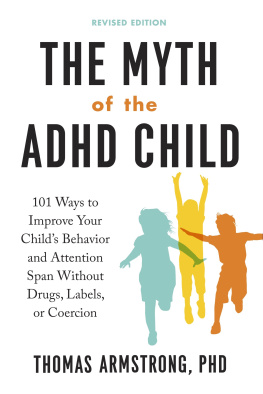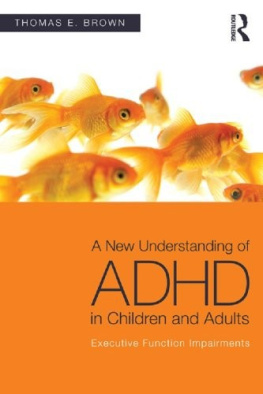
Identifying Hyperactive Children
Peter Conrad's Identifying Hyperactive Children is at the same time a classic study of the labelling of deviant behaviour and a prescient view of what has since become a major social problem. It remains the best sociological analysis of hyperactivity. Its reissue with an informative introduction and recent paper on adult ADHD is welcome news for the sociology of deviance and social control.
Professor Allan Horwitz
This book is a classic work in medical sociology. It served as a jumping-off point for Peter Conrad's development of the theory of medicalization, which has been central to medical sociology, and increasingly to medicine and other fields. It is fitting that one of the senior scholars in medical sociology can revisit the work that began his career, and show us how incredibly relevant it is three decades later. Conrad updates his work by showing increases in ADHD diagnosis, how adults now are increasingly diagnosed, and how the greatly expanded power of pharmaceutical companies can cloud medical and personal judgment.
Dr Phil Brown
Although first published thirty years ago this book remains one of the few sociological studies of what has become a major social problem the medicalization of hyperactivity. Its reissue with a new introduction and concluding chapter makes the book essential reading for all those concerned with medicalization in general and the case of attention deficit hyperactivity disorder in particular. Immediately it will be clear how many of the concerns of the original book remain highly pertinent today, while the material that has been added highlights what has changed in particular the expansion of ADHD to adults.
Professor Jonathan Gabe
Ashgate Classics in Sociology
Series Editors:
Robert Dingwall, University of Nottingham, UK
Alan Aldridge, University of Nottingham, UK
Tim Strangleman, London Metropolitan University, UK
This series is the successor to Cardiff Classics in Medical Sociology, expanding the publishing agenda of the original series to include reprints and revised editions of influential works across the discipline of sociology and collections of key articles by well-known sociologists.
Also in the series:
A Constant Burden
The Reconstitution of Family Life
Margaret Voysey Paun
ISBN 0 7546 4470 7
Sociology and Medicine
Selected Papers by P.M. Strong
Edited by Anne Murcott
ISBN 0 7546 3844 8
Essays on Professions
Robert Dingwall
ISBN 0 7546 4614 9
Identifying Hyperactive Children
The Medicalization of Deviant Behavior Expanded Edition
Peter Conrad
Brandeis University, USA
First published 2006 by Ashgate Publishing
Published 2016 by Routledge
2 Park Square, Milton Park, Abingdon, Oxon OX14 4RN
711 Third Avenue, New York, NY 10017, USA
Routledge is an imprint of the Taylor & Francis Group, an informa business
Copyright 2006 Peter Conrad
Peter Conrad has asserted his right under the Copyright, Designs and Patents Act, 1988, to be identified as the author of this work.
Form Hyperactive Children to ADHD Adults: Observations on the Expansion of Medical Categories by Peter Conrad and Deborah Potter is reprinted by kind permission of the authors and publisher. 2000 Society for the Study of Social Problems, Inc. All rights reserved.
All rights reserved. No part of this book may be reprinted or reproduced or utilised in any form or by any electronic, mechanical, or other means, now known or hereafter invented, including photocopying and recording, or in any information storage or retrieval system, without permission in writing from the publishers.
Notice:
Product or corporate names may be trademarks or registered trademarks, and are used only for identification and explanation without intent to infringe.
British Library Cataloguing in Publication Data
Conrad, Peter, 1945
Identifying hyperactive children: the medicalization of
deviant behavior. -Expanded ed. -(Ashgate classics in sociology)
1. Hyperactive children 2. Attention-deficit hyperactivity
disorder-Diagnosis 3. Deviant behavior
I. Title
618.9'28589
Library of Congress Control Number: 2005929786
ISBN 9780754645184 (hbk)
ISBN 9781138257955 (pbk)
To my parents
Robert Dingwall
Peter Conrad has long been recognized as a leading contributor to the analysis of medicalization, the movement to treat deviance as a medical rather than a behavioural problem in modern societies. Although this thesis has become commonplace in contemporary social science, its intellectual roots in medical sociology have often been overlooked. This new edition provides an opportunity both to remedy that neglect and to note the anchorage of Conrads approach in the mainstream of Anglo-American sociology. As he notes, the perception that there is a relationship between sickness and crime, as forms of deviance, is a legacy of the genius of Talcott Parsons. The medicalization of deviant behaviour undermines the responsibility of that behaviours agent and offers a solution that diverts attention from its possible societal generators. ADHD, for example, becomes a failure of children rather than a failure of school regimes. The pharmaceutical-medical complex steps forward to offer a remedy that suppresses the troublesome behaviour and leaves the institutional contributions unexamined. The social power of prestigious adults prevents us from asking whether the ADHD epidemic results from the increasingly confined, boring and test-oriented practices of contemporary schooling creating inhumane environments for children?
Conrads study represents the high water mark of the sociological study of social problems as it flourished from the 1920s until the 1970s. It draws on one of the great insights of twentieth century sociology, that the definers of deviant behaviour must be studied as closely as the alleged perpetrators. Just as the police have a limited interest in eliminating crime because of its implications for individual and organizational careers and resources so too do doctors and the pharmaceutical industry have a limited interest in eliminating ill-health. Indeed, to the extent that they succeed, they are drawn to search for new turf to colonize by problematizing the normal physical experiences of humankind: menopause, childbirth, infertility, and aging.
This claim is not, of course, wholly uncontested. P.M. Strong, for example, whose essays are collected in a forthcoming volume in this series, argued that it was important to distinguish between the medical entrepreneurs, who were constantly trying to occupy new territory by inventing new diseases, and the professions infantry, who saw themselves as overburdened by existing problems and were often uninterested in taking on new ones. As Conrad concedes, the study of medicalization requires close attention to the classic issues of who is advocating it, with what interest and under what conditions. This book offers a model of how to proceed. It reminds us that medical sociology is a branch of the sociology of deviance rather than the servant of the modern health industry and it recalls the intellectual radicalism of a generation that could lift its eyes above the outstretched palm with the next research contract grasped in it.




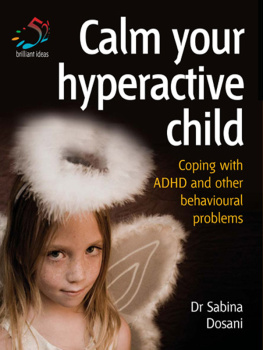
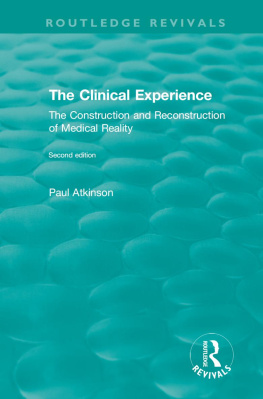
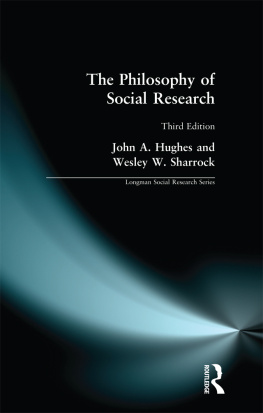
![Matthew Smith [Inconnu(e)] - Hyperactive: The Controversial History of ADHD](/uploads/posts/book/128888/thumbs/matthew-smith-inconnu-e-hyperactive-the.jpg)
